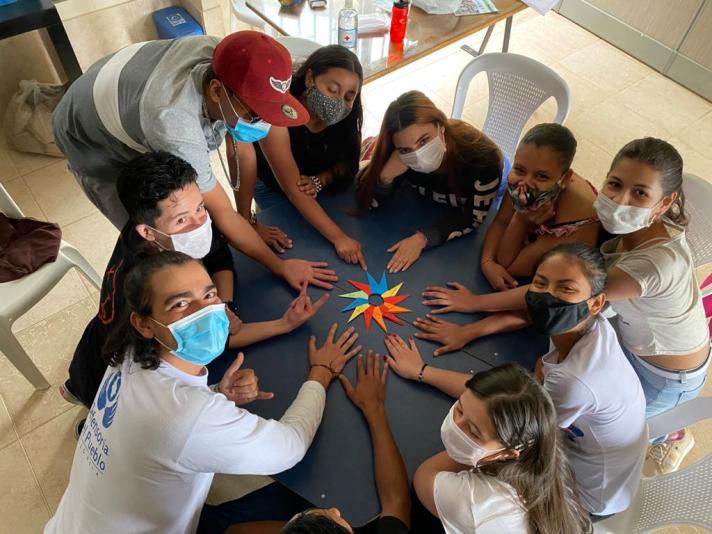In Colombia, thousands of people have been forced to flee their homes due to the conflict. Maria Victoria* (60) is one of them.
She has lost her home twice and lived in constant fear. But at “Casa de los Derechos,” a multidisciplinary safe space supported by the UN Refugee Agency (UNHCR) and funded by the EU, she received support to overcome her pain.
"It is here that I found a family, which I had left behind,” she says. This is her story.
The Casa de los Derechos (House of Rights) in Bello, Antioquia, provides protection and care for the population living in Granizal. It is the second largest settlement of internally displaced people in Colombia.
Maria Victoria´s life has been marked by internal displacement. First, she had to flee her farm in Colombia’s countryside to reach Medellin with her 3 children and her husband.
That same year, due to the intra-urban conflict, she lost her husband and had to flee her home again. With her children, she fled to a city she had never lived in before.
In 2001, she sought refuge in a settlement on the outskirts of Bello, near Medellin. That same year, thousands of people like her arrived fleeing violence. They built their new homes in the mountains with their own hands, using wood and plastic scraps.
“We couldn't move from here for fear of getting evicted at any given moment,” she says. Her story is shared by some 28,000 inhabitants who now live in what is known as “the settlement of Granizal”.
“Casa de los Derechos" was built in 2008 thanks to an initiative of the Colombian Ombudsperson's Office. Since its early days, it has been supported by the UN Refugee Agency and the European Union.
It provides a safe space for meetings, training, protection, and access to rights for a vulnerable population.
“It is a space that transcends the physical. Our team provides a response tailored to the needs and demands of the context and the dignity of the communities. But it is only built by the hands of the people who surround it,” explains Vanessa Torres, an official from the Ombudsperson's Office and coordinator of the Casa de los Derechos.
“We were isolated, distrustful and fearful of each other when the Ombudsperson's Office began working with us; we were battered by violence,” adds Maria Victoria. “Today, I can safely say that thanks to them we have built a united community of strong leaders,” she notes.
Empowering the leaders
Maria Victoria was one of the first women to join in the protection actions organised at the “Casa de los Derechos”. The activities included community integration workshops, recreational activities, psychosocial and legal support, and leadership and human rights training.
“First, I started with handicrafts. Then, I learned about how to access my rights. When I least imagined it, I studied leadership for 2 years. I became part of the Casa and a leader in my community,” says Maria Victoria with a smile.
Today she belongs to the group “Mujeres Unidas de Granizal” (United Women of Granizal). The group provides support informing about referral mechanisms to services elsewhere and explaining the rights and services that should be guaranteed to the community.
Among them, the right to water - one of the biggest causes the community has fought for, with the support of the University of Antioquia. In 2020 they managed to get a ruling in their favour and saw the arrival of cisterns with drinking water for the first time. They are now awaiting the construction of a water supply network.
The “Casa” also opens its doors to other organisations providing services to the community. It allows for child vaccination sessions, technical training, the cultivation of a community garden, and its walls for artistic expressions. “Over time, it has become a welcoming place for reflection and learning,” adds the Casa's coordinator.
Approximately 1,600 people from Venezuela who have arrived in Granizal also receive support at the Casa, creating an intercultural space.
“I have learned to see all my neighbours as equals and, more than that, I learn from their knowledge because there are indigenous people and Afro-Colombians here. We have been welcoming the Venezuelan population in recent years,” she says.
Maria Victoria's children have grown up and left the settlement, but she does not feel alone.
“I always feel accompanied. During the lockdown in the pandemic, I received calls from the folks at the Ombudsperson's Office; they were checking on us. They know that the Casa de los Derechos is my second home, a second home to all the people of Granizal,” she concludes.
*Name changed for protection.
Story by Ángela Hurtado, UNHCR Colombia.
Publication date: 18/01/2022


